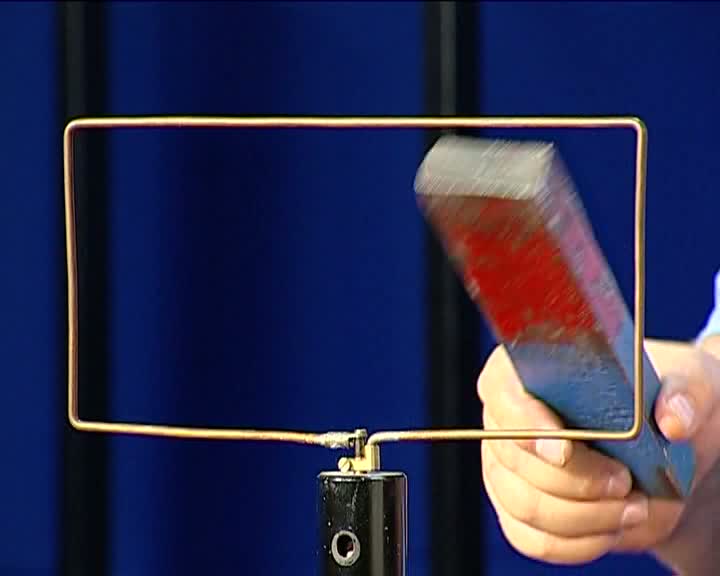„Mágneses tér hatása vezetőkeretre” változatai közötti eltérés
| (egy szerkesztő egy közbeeső változata nincs mutatva) | |||
| 5. sor: | 5. sor: | ||
== Az elhangzó szöveg == | == Az elhangzó szöveg == | ||
| − | A szereplők egy függőleges tengely körül elfordulni képes, áramtól átjárható keret, egy áramforrás és egy erős mágnes. Áram nélkül nincs hatással a mágnes a keretre. A kerettel olyan erőhatások mutathatók ki, amelyek függőleges tengely körüli forgatást eredményeznek. A mágneses dipólus erővonalainak ismeretében megjósolható | + | A szereplők egy függőleges tengely körül elfordulni képes, áramtól átjárható keret, egy áramforrás és egy erős mágnes. Áram nélkül nincs hatással a mágnes a keretre. A kerettel olyan erőhatások mutathatók ki, amelyek függőleges tengely körüli forgatást eredményeznek. A mágneses dipólus erővonalainak ismeretében megjósolható, hogy akkor a leghatásosabb a forgatás, amikor a dipólus a függőleges tengelyre és a keret síkjára is merőleges. Az indukcióvonalak irányának ellenkezőjére változtatásával a forgatás iránya is megfordul. |
| − | = Effect of the magnetic field | + | == Effect of the magnetic field on the conducting frame == |
| − | + | The necessary equipment is composed of a conducting frame that can rotate around a vertical axis, a current source, and a strong magnet. Without electric current, the magnet has no effect on the frame. With the frame, we can demonstrate forces that can initiate rotation around the vertical axis. By knowing the field lines of a magnetic dipole, it can be predicted that the rotation is the most effective when the dipole is perpendicular to both the vertical axis and the plane of the frame. By changing the induction lines to the opposite direction, the rotation will also change direction. | |
| − | + | ||
| − | The necessary | + | |
</wikitex> | </wikitex> | ||
A lap jelenlegi, 2013. július 1., 12:26-kori változata
Az elhangzó szöveg
A szereplők egy függőleges tengely körül elfordulni képes, áramtól átjárható keret, egy áramforrás és egy erős mágnes. Áram nélkül nincs hatással a mágnes a keretre. A kerettel olyan erőhatások mutathatók ki, amelyek függőleges tengely körüli forgatást eredményeznek. A mágneses dipólus erővonalainak ismeretében megjósolható, hogy akkor a leghatásosabb a forgatás, amikor a dipólus a függőleges tengelyre és a keret síkjára is merőleges. Az indukcióvonalak irányának ellenkezőjére változtatásával a forgatás iránya is megfordul.
Effect of the magnetic field on the conducting frame
The necessary equipment is composed of a conducting frame that can rotate around a vertical axis, a current source, and a strong magnet. Without electric current, the magnet has no effect on the frame. With the frame, we can demonstrate forces that can initiate rotation around the vertical axis. By knowing the field lines of a magnetic dipole, it can be predicted that the rotation is the most effective when the dipole is perpendicular to both the vertical axis and the plane of the frame. By changing the induction lines to the opposite direction, the rotation will also change direction.
